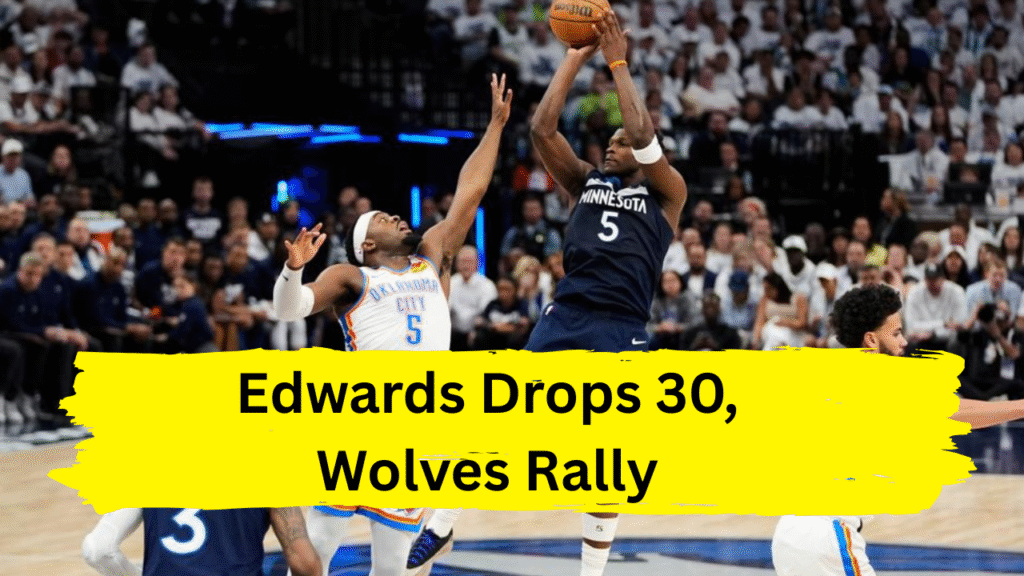In a performance that blended raw athleticism, strategic brilliance, and unshakable leadership, Anthony Edwards propelled the Minnesota Timberwolves to a resounding 143-101 victory over the Oklahoma City Thunder in Game 3 of the Western Conference finals. Facing a 2-0 series deficit and the looming threat of a sweep, Edwards delivered a masterclass, scoring 30 points in just three quarters while outshining MVP Shai Gilgeous-Alexander and redefining the trajectory of the series.
The Spark That Ignited the Timberwolves
From the opening tip, Edwards played with a ferocity that electrified the Target Center crowd. He outscored the entire Thunder roster 16-14 in the first quarter alone, showcasing a blend of stepback threes, explosive drives, and defensive tenacity that left Oklahoma City scrambling . His early dominance set the tone for a historic night: Minnesota’s 72-point first half shattered franchise playoff records, while their 143 total points marked the highest postseason output in team history .
Edwards’ efficiency was staggering — 12-of-17 from the field, 5-of-8 from beyond the arc — a stark contrast to his struggles in Games 1 and 2. “I was in rhythm last game; the shots just weren’t falling,” he said postgame, crediting his resurgence to relentless practice and trust in his craft . His performance not only revived Minnesota’s offense but also galvanized teammates like Julius Randle, who rebounded from a benched Game 2 to add 24 points, declaring, “We’re home now!” to a roaring crowd .
Defensive Adjustments That Silenced the MVP
While Edwards’ offensive fireworks stole headlines, the Timberwolves’ defensive strategy dismantled Oklahoma City’s rhythm. Minnesota held Gilgeous-Alexander to a playoff-low 14 points on 4-of-13 shooting, a seismic drop for a player averaging nearly 30 points this postseason . The Wolves deployed a mix of zone defenses and disciplined closeouts, denying SGA his trademark drives and free-throw opportunities. Chants of “Free-throw merchant!” echoed through the arena as Gilgeous-Alexander attempted just four foul shots, a far cry from his 14.5 average in the series’ first two games .
Coach Chris Finch emphasized the importance of “cleaner” defense, avoiding the reckless fouls that plagued Minnesota earlier. Rudy Gobert’s presence in the paint and Jaden McDaniels’ perimeter containment forced Oklahoma City into rushed shots and 15 turnovers, which the Wolves converted into 16 first-quarter points alone .
The Unsung Heroes: Bench Depth and Rookie Revelation
Beyond Edwards’ heroics, Minnesota’s bench delivered a seismic contribution. Rookie Terrence Shannon Jr., who had logged just 20 playoff minutes prior to Game 3, erupted for 15 points in 13 minutes, injecting energy during a pivotal second-quarter stretch . His unexpected breakout, coupled with Mike Conley’s steady play, highlighted a 66-49 bench scoring advantage over Oklahoma City’s starters .
The Thunder, meanwhile, unraveled under the weight of Minnesota’s physicality. Their top-ranked defense surrendered open threes and transition dunks, while role players like Jalen Williams (7 points) vanished under the Wolves’ defensive pressure .
A Series Rekindled: What Lies Ahead
Though the Wolves trimmed the series deficit to 2-1, Edwards remained pragmatic: “We’re still down. It’s just one win. This team is the best in the NBA; beating them more than once will be tough” . Yet, Saturday’s rout revealed vulnerabilities in Oklahoma City’s armor. The Thunder’s 42-point loss — their worst in franchise postseason history — exposed flaws in their half-court execution and reliance on Gilgeous-Alexander’s isolation brilliance .
For Minnesota, the challenge is sustaining this intensity. Finch praised Edwards’ evolving leadership, noting how the 23-year-old’s positivity after Game 2 losses set the stage for Saturday’s response . With Game 4 looming, the Wolves aim to leverage home-court momentum, where they’ve lost just once this postseason .
Conclusion: A Star’s Ascendance and a Team’s Resilience
Anthony Edwards’ 30-point masterpiece was more than a statistical feat — it was a declaration of his arrival among the NBA’s elite. By outdueling the MVP and recalibrating his team’s defensive identity, he breathed life into a series that seemed destined for a swift conclusion. The Timberwolves’ emphatic win underscores a truth often forgotten in playoff basketball: momentum is fleeting, but resilience is transformative.
As the Thunder regroup, Minnesota’s task is clear: replicate the urgency, precision, and collective fire that turned a potential meltdown into a defining beatdown. If Edwards continues to soar, the Wolves may yet script one of the most improbable comebacks in conference finals history.


